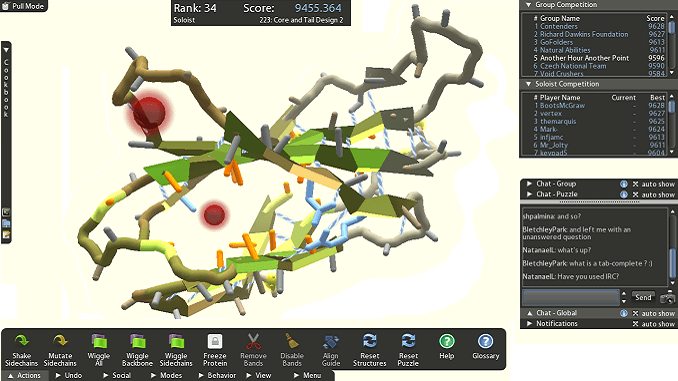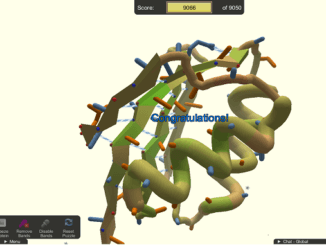
An online game has helped determine the structure of an enzyme that could pave the way for anti-Aids drugs.
The game, called Foldit, allows players to create new shapes of proteins by randomly folding digital molecules on their computer screens. In the journal Nature Structural and Molecular Biology, scientists write that they have been puzzled by the protein’s structure for over a decade. But it took the online community just a few days to produce the enzyme’s model.
Proteins are extremely complex organic compounds that everything is made of, and an enzyme is a particular type of protein. The enzyme the gamers were presented with is called M-PMV retroviral protease – an enzyme that plays a key role in the development of a virus similar to HIV. Scientists have been trying to determine its precise structure for years.
The result could be an important step forwards in the development of anti-Aids drugs. Following simple rules, gamers playing Foldit had to turn and flip a digital 3D model of the enzyme on their computer screens, to try out all folding combinations that were possible. They eventually obtained the optimum one – the state that needed the lowest energy to maintain.
Biochemist Firas Khatib of the University of Washington – where Foldit was created in 2008 – said that the goal was to see if “human intuition could succeed where automated methods had failed”. The researchers were so impressed with the result that they even included some participating gamers as co-authors of the study.
Complex structures
Even a small protein is able to fold in a huge variety of different ways, and it is always a challenge, even for computers, to figure out which of the many possible structures is the best one.
“Foldit attempts to predict the structure of a protein by taking advantage of humans’ puzzle-solving intuitions and having people play competitively to fold the best proteins,” states the game’s website.
“Since proteins are part of so many diseases, they can also be part of the cure.”
“Players can design brand new proteins that could help prevent or treat important diseases.”
To play, no previous knowledge of proteins, biochemistry or biology is required – all a user has to have is a computer and an internet connection. Once a gamer downloads an easy-to-install plug-in, he or she can start competing with other players, rotating complex three dimensional molecular structures with a click of the mouse. The goal is either to design an entirely new protein, or to predict a certain structure, so that once an online model is generated, scientists and biotech companies take over.
The latest breakthrough, according to the paper’s authors, is the first time that online gamers have solved a longstanding scientific problem.
Seth Cooper, a co-creator of Foldit and its lead designer, said that games provide a framework “for bringing together the strengths of computers and humans”.
“People have spatial reasoning, something computers are not yet good at,” Dr Cooper said.
“These results show that gaming, science and computation can be combined to make advances that were not possible before.”
Results obtained by gamers playing Foldit have also helped scientists in Alzheimer’s and cancer research.
This article was written by Katia Moskvitch, Technology reporter and published on BBC News on 20/09/2011
http://www.bbc.co.uk/news/technology-14986013


